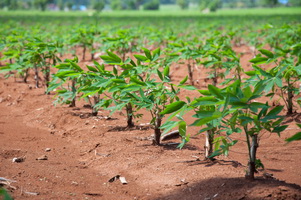
Researchers Perform Allele Exchange at EPSPS Locus in Cassava using CRISPR-Cas9
January 31, 2018| |
 Effective weed control can protect yields of cassava (Manihot esculenta) storage roots from losses. Hence, a herbicide tolerant cultivar could benefit farmers. The team of Aaron W. Hummel from the University of Minnesota applied traditional transgenesis and gene editing to generate glyphosate tolerance in cassava.
Effective weed control can protect yields of cassava (Manihot esculenta) storage roots from losses. Hence, a herbicide tolerant cultivar could benefit farmers. The team of Aaron W. Hummel from the University of Minnesota applied traditional transgenesis and gene editing to generate glyphosate tolerance in cassava.
The team aimed to replace the native promoter of cassava's 5-enolpyruvylshikimate-3-phosphate synthase (EPSPS) gene with a strong constitutive promoter. To achieve this, the team prepared a CRISPR-Cas9 endonuclease that targets the promoter of the EPSPS locus.
Two repair templates were also combined with the guide RNA and the Cas9 nuclease to help initiate homologous recombination and assist in the insertion of the new promoter. The team then introduced the best-performing allele of the EPSPS locus into the cassava genome while also performing a promoter swap. EPSPS-edited plants exhibited normal phenotypes and were tolerant to high doses of glyphosate.
This study demonstrates a strategy for creating glyphosate tolerance in crops as well as the potential of gene editing for further improvement of cassava.
For more information, read the article in Plant Biotechnology Journal.
| |
Biotech Updates is a weekly newsletter of ISAAA, a not-for-profit organization. It is distributed for free to over 22,000 subscribers worldwide to inform them about the key developments in biosciences, especially in biotechnology. Your support will help us in our mission to feed the world with knowledge. You can help by donating as little as $10.
-
See more articles:
-
News from Around the World
- Hunger in Conflict Areas Continues to Escalate
- Namibia Launches First GM Detection Lab
- African Women Vow to Rally Behind Biotech
- Scientists Explain How A Protein Helps Plants "Muscle Up" Bacteria in the Cold
- Arctic® Fuji Apple Gets Canadian Approval
- Importance of IP and Its Application to Biotech Emphasized
- Gene Editing and Genomics Discussed at UP Los Baños Seminar
- "Wild" Genes Open Up Opportunities for Better Rice Varieties
- UZH Scientists Develop Wheat Lines Resistant to Powdery Mildew
-
Research Highlights
- Researchers Identify Plum Pox Virus Susceptibility Genes in Apricot
- Walnut Gene Involved in Cadmium Stress Response
-
Beyond Crop Biotech
- Non-coding DNA Vital for Brain Development
- Australian OGTR Invites Comments for Field Trial of GM Buffalo Grass
-
Announcements
- 10th World Potato Congress
-
Plant
- Researchers Perform Allele Exchange at EPSPS Locus in Cassava using CRISPR-Cas9
-
Read the latest: - Biotech Updates (February 11, 2026)
- Gene Editing Supplement (January 28, 2026)
- Gene Drive Supplement (February 22, 2023)
-
Subscribe to BU: - Share
- Tweet
